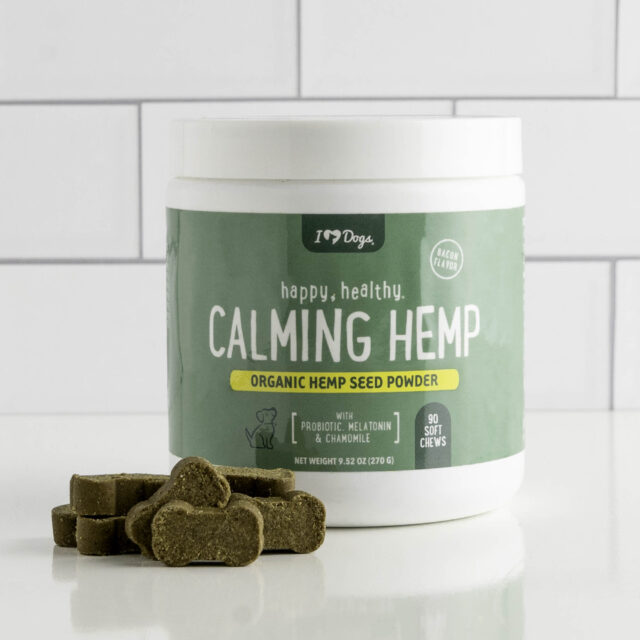Anxiety disorders are the most common type of mental illness for humans. Anyone with anxiety knows how difficult it can be to manage in certain scenarios. As it turns out, millions of dogs are also affected by feelings of anxiety and stress, but they can’t verbally tell us about their struggles. So, L-theanine for dogs could be a solution!
Related: Best Calming Supplements for Dogs That Really Work
Dogs shouldn’t have to struggle silently with their fears and worries. So, it’s up to us to find good supplements to help our furry friends relax. Several calming ingredients are used in pet supplements, but a lesser-known option is L-theanine for dogs. So, is L-theanine safe for dogs, and what can it do to help calm your anxious dog?

What is L-Theanine for Dogs?
L-theanine is an amino acid most commonly found in green tea, black tea, and mushrooms. Yet, it’s also an ingredient in products like Anxitane, which are over-the-counter tablets used for helping anxiety and nervousness in dogs. Green tea leaves usually have about 20 mg of L-theanine, but supplements can have up to 200 mg per tablet, depending on the product.
This calming item was discovered by Japanese scientists in 1949, and it became a key part of diets in Japan in the 1960s due to its relaxing properties. Researchers did extensive testing to prove that it could reduce stress and improve sleep. Over the years, it has regularly been used in medications and supplements for easing anxiety in humans. As it turns out, it can also benefit your canine’s stress.
Studies show that L-theanine can even benefit cats, and positive results appeared in as little as 15 days. Yet, many dogs and cats may need to take the product for closer to 30 days before significant improvements occur. Some products will act faster than others.
Is L-Theanine Safe for Dogs?
Yes, L-theanine is safe for dogs of all ages and sizes. For both humans and dogs, this amino acid has no significant side effects, making it a great alternative to other types of medicine. It’s often used as a natural alternative to potent drugs like Xanax, Prozac, and Valium.
Yet, like all new medications and supplements, it should be served with caution at first.

What is L-Theanine Used for in Dogs?
L-theanine for dogs can have many benefits, but the main thing it’s used for is calming anxiety. Dog parents use it because it’s a safe option with minimal side effects.
Once your dog consumes L-theanine, it will be absorbed into the bloodstream during digestion. Then, it will make its way up to your dog’s brain, where it will give them pharmacological effects to decrease anxious thoughts and behaviors. Overall, L-theanine will help calm your furry friend to make life easier for both of you.
Reduces Anxiety
L-theanine can increase alpha waves in your dog’s brain to help give them a calm and focused mentality. The higher the dose, the more alpha waves it can produce. Thus, it can help your dog feel at ease without making them drowsy, as certain medications might.
It will prevent your dog from feeling anxious, which will also reduce the unwanted behaviors related to stress. L-theanine may increase dopamine and GABA (an inhibitory neurotransmitter) in the brain, which will improve their mood and help them feel at peace. It may take a while to affect your dog fully, so it’s best for pups that are regularly anxious rather than dogs who only get stressed on rare occasions.
Promotes Healthy Sleep
Since L-theanine can make dogs feel calm and less stressed, it can also help them feel more at ease when they try to sleep. Stress can cause dogs to wake up throughout the night as it could for humans. So, canines will be able to fall asleep faster and sleep through the night better by taking this amino acid.

Provides Relaxation
As a result of better sleep and less anxiety, your dog will feel more relaxed. Relaxation can help lower your dog’s blood pressure, improve cognitive function, and boost mood. They will be less likely to have aggressive or destructive behaviors while talking L-theanine. This amino acid may also have anti-inflammatory properties, which could slow aging in dogs.
It’s important to note that if your dog has extreme cases of anxiety or aggression, this ingredient might not affect them. While it can calm them down, it won’t solve behavioral problems for good. If you’re overly concerned about your dog’s unwanted habits, you should consult a dog trainer instead of relying on medication.
Related: 10 Best Liver Supplements for Dogs
What Causes Anxiety in Dogs?
Many things can cause anxiety in dogs, but some scenarios are more common than others. Anxious dogs may show symptoms like trembling, hiding, whining, barking excessively, drooling, pacing, acting restless, or having frequent accidents. If you see your dog exhibiting these behaviors, pay attention to its surroundings and actions to determine what might be causing it.
Removing the stressor is the best way to calm your dog down, but that’s not always possible. If you’re unsure what’s triggering your dog’s stress, here are a few reasons to consider.
Being Alone
The most common type of canine stress is separation anxiety. Your dog may become worried or destructive when you leave them behind because dogs are social creatures. If they get used to spending a lot of time with you, it might be difficult for them when you have to be apart. Many dogs have separation anxiety if they’ve experienced neglect or other types of trauma in the past.
Loud Noises
Fireworks, thunderstorms, and other overwhelming noises can cause dogs to hide in fear. Some dogs might be spooked by unexpected sounds, while others may be triggered by something specific. Dogs have more sensitive hearing than us, so sounds that we’re used to might easily frighten them.

Sudden Changes
Any change can increase your dog’s anxiety. Moving to a new house, going on a vacation, or leaving your pup with a sitter can all freak them out. You may notice changes in behaviors if they’re unhappy about the new routine. Some dogs also get nervous at certain locations, such as the vet or groomer, or around unfamiliar people and animals.
Loss
The loss of a loved one can cause stress for anyone. If your dog grew up with another pet or human who has since passed away, it might become more stressed than usual. Break-ups can also be confusing and scary for dogs, especially if they are very close to both people.
Even after you address the trigger of your dog’s stress, it might be something you can’t control. So, that’s when you can offer your pup a calming supplement that includes items like L-theanine.
Related: 12 Best Dog Breath Fresheners
How Much L-Theanine for Dogs is Safe?
The L-theanine for dogs dosage varies based on your furry friend’s needs and the type of supplement you choose. In most cases, you can give the dose to your dog twice daily. You can give them supplements more frequently if needed, but doses must be at least six hours apart. The doses below are just suggestions, so you should consult your vet for the most accurate dosage.
How Many Milligrams of L-Theanine Per Day for Dogs?
Here is the suggested amount of L-theanine mg for dogs based on their weight:
- Under 20 pounds – 100 mg
- 21 to 40 pounds – 200 mg
- 41 to 60 pounds – 300 mg
- 61 to 80 pounds – 400 mg
- Over 81 pounds – 500 mg
There is no maximum dosage, but it’s safest to consult your vet before going above 500 mg. Even though this amino acid has minimal risks, it’s still best to be cautious since it’s new for your canine companion.

Anxious cats need doses similar to small dogs. Anywhere from 50 to 200 mg is an ideal dosage for a feline. For animals and humans, it’s best to take a dose within the two hours before bedtime.
If you give your dog L-theanine in the form of an Anxitane pill, here are the recommended doses:
- Under 22 pounds – 1/2 small tablet
- 22 to 55 pounds – 1/2 medium-large tablet
- Over 50 pounds – 1 medium-large tablet
When you first give your dog L-theanine, you can start with a smaller dose to be safe. Then, if their body handles it well, you can adjust it to the proper amount. When in doubt, always confirm the accurate dosage with your vet before serving something new to your dog.
Related: The 10 Best Anti-Anxiety Beds for Dogs
Risks of L-Theanine for Dogs
L-theanine is a low-risk supplement with no known side effects for dogs. In humans, it could cause headaches or low blood pressure, but it’s unclear if the same is true for canines. If your dog has hypotension, it’s a good idea to avoid this ingredient just in case.
Most L-theanine products haven’t been tested for pregnant or nursing dogs. Dogs with severe phobias and aggression may not improve by taking this medication. If your dog takes it for 60 days with no positive results, you should stop giving it to them and talk to your vet about other options.
Even though L-theanine has minimal risks for your furry friend, you should always be cautious when giving them something new. Closely monitor their behaviors when they start taking it. Then, if you notice anything unusual or concerning, reach out to your vet right away.
Pets who overdose don’t seem to have any significant reactions. A study with rats showed that the rodents had no side effects even after taking four grams per day. Of course, you should still avoid going over your pet’s recommended dose unless a vet tells you otherwise.

Are There Any Drug Interactions?
Do not give your dog blood pressure medications while they’re taking L-theanine unless your vet suggests it. Other than that, there are no drug interactions to be aware of. However, you should still let your vet know what other medications your dog is taking before you start giving them L-theanine.
How to Serve L-Theanine to Dogs
Natural items with L-theanine, such as some mushrooms, won’t have a high enough dose for your dog. So, there are two main kinds of L-theanine products made for dogs: tablets and treats. Tablets are common, but like most medicine, your dog might not be eager to eat them. If you have a picky pup, you’ll need to hide the tablet in dog food, peanut butter, or a pill pocket.
However, treat supplements with L-theanine are an easier alternative for dogs who are great at refusing pills. Hemp treats are a common source of L-theanine for dogs, but there are many other options too. Supplements that look and smell like treats seem like a snack to dogs, so they may get excited to take them.
While treats seem like the best method, it all depends on what your dog needs L-theanine for. Check the ingredients of each product to make sure it’s suitable for your pup. Carefully read the warnings and active ingredients on the container since every product may have different benefits and risks.
Try Anxiety Treats!
If your dog is the master of spitting out pills no matter how well they’re hidden, then it’s safe to say that a treat will be your best bet. Not all treat supplements are created equal, so you’ll want to find a company that you can trust. Before purchasing any product for your dog, look to ensure it has high-quality ingredients.
The iHeartDogs 9-in-1 Calming Chews is a product with L-theanine that your pup can try. The soft, bacon-flavored treats will trick your dog into eating something healthy. These chews can ease anxiety, encourage healthy sleep, and improve digestion. Some added benefits from ingredients include anti-inflammatory properties, seizure control, and heart health.
In addition to L-theanine, these chews include organic hemp powder, chamomile, valerian root, melatonin, and L tryptophan. Together, all these ingredients can provide relaxation for your pup. Plus, every container donates 14 healthy meals to shelter pups, so your dog’s improved health will also fill the bellies of dogs in need.
Your dog shouldn’t have to let their anxiety get the best of them. There are plenty of L-theanine products on the market to calm your dog down and reduce anxiety symptoms. So, decide which supplement is best for your dog to help them live a stress-free life.

 Toledo, United States.
Toledo, United States.